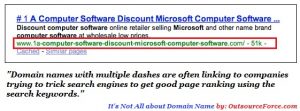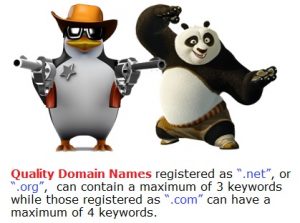
A domain name is a name assigned to identify a specific website on the World Wide Web. It is like a person’s mailing address – the domain name is the website’s way to tell people where to find it.
Exact Match Domain and SEO
A website address comprised of keywords which are not the brand or company name is called an Exact Match Domain or EMD. Such keywords should match the search query words precisely. If you want to create a website targeting the keywords “top world attractions”, the EMD of the website will be topworldattractions.com. With an EMD, ranking in search engines is boosted, as keywords are featured in the domain name and therefore easily detected and indexed by search engines.
Exact match domains have offered a competitive advantage for SEOs who understood how to use them. EMDs represent what SEOs do best – achieve search engine ranking for the site. EMD is an excellent strategy to get the pages to rank well on Google and other search engines.
When EMDs are Not Helping SEO
One must understand that some marketers try and play a trick on search engines by using single dashed and multiple dashed EMD to contain keywords to boost a company’s page ranking and not to provide the user with valuable and useful information. EMDs used for such purpose will not help boost the site’s page rankings because Google had updated their algorithms in order to weed out low quality EMDs in their search results.
Multiple Dashed Domains

Statistics have proven that domains having more than one dash are in most cases in real life, spammy. As such, you should not use double dash domains for your website since it may be included in those marked or labeled spammy by search engines like Google, even if the site has valuable and relevant content to the search query. Domain names with multiple dashes are often linking to companies trying to trick search engines to get good page ranking using the search keywords.
Single Dashed Domains
While some websites with single dash domain names have ranked well with search engines, SEO experts are of the opinion that single dash EMDs also provide very minimal advantage over a non-keyword domain and must therefore be ruled out just the same.
Number of Keywords in EMD
According to Matt Cutts of Google, quality domain names should have 2 to 3 keywords for a domain name on “.net”, or “.org”, and 3 to 4 for “.com” and this will be effective for EMDs to boost the website’s ranking. You go beyond these numbers and you will send signals to alarm search engine crawlers to suspect the site as spammy.

Google’s latest algorithm update which targeted low quality domain names have affected a lot of sites with EMD. As Google focuses more towards organic search, search engine bots now consider most sites with multiple and single dashed EMDs worthless or of low quality.
To fight off the effects of such algorithm update, website owners should focus on the site’s content and not on the EMD as having an EMD with single and multiple dashed domains might result in the washout of years of hard work. The way to counter this is by buying a new domain and start afresh by transferring data from the EMD site to the new website before finally phasing out the EMD site. You could use redirects if search engines still cache your old website or if the old site still have value. You can check here how redirection works and which one to use. Introduce the new website to users and focus on building a better brand through building up quality links and quality content.
Despite the sweeping effects of Google algorithm update on EMDs, if the content and information on the website is relevant and useful for the end user, EMDs may still enjoy certain benefits for their websites. They can still help attract social mentions with keywords or keyword anchor text. They can also still help in the marketing and branding of a website.



